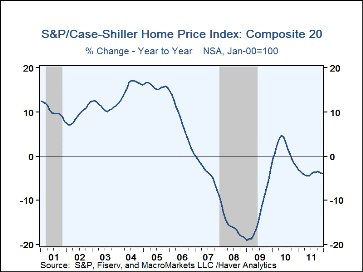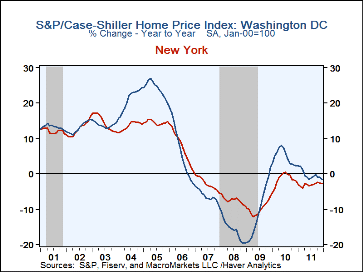 Global| Feb 28 2012
Global| Feb 28 2012U.S. Case-Shiller Home Price Index Falls Again
by:Tom Moeller
|in:Economy in Brief
Summary
Year-end and full year 2011 were periods of house price decline. The seasonally adjusted Case-Shiller 20-City Home Price Index dropped 1.1% in December after an unrevised 1.3% decline in November. That pulled prices over the last [...]
 Year-end and full year 2011 were periods of house price decline. The
seasonally adjusted Case-Shiller 20-City Home Price Index dropped 1.1% in
December after an unrevised 1.3% decline in November. That pulled prices
over the last twelve months down 4.0% with a like 3.9% decline for the
yearly average. The narrower 10 City Composite Home Price Index was off 0.5%,
during December, -3.9% y/y and down 3.4% for the full year.
Year-end and full year 2011 were periods of house price decline. The
seasonally adjusted Case-Shiller 20-City Home Price Index dropped 1.1% in
December after an unrevised 1.3% decline in November. That pulled prices
over the last twelve months down 4.0% with a like 3.9% decline for the
yearly average. The narrower 10 City Composite Home Price Index was off 0.5%,
during December, -3.9% y/y and down 3.4% for the full year.
For all of last year there were no cities that posted higher prices versus 2010. The worst of the declines occurred in Minneapolis (-8.2%), Phoenix (-7.3%), Portland (-7.2%), Atlanta (-7.0%), Chicago (-6.8%) and Los Vegas (-6.5%). Posting moderate price declines were Detroit (-0.3%), Washington D.C. (-0.3%), Boston (-2.0%), Denver (-2.1%), Dallas (-2.4%) and New York (-3.1%).
The Case-Shiller home price series is value-weighted, i.e., a greater index weight is assigned to more expensive homes. It is calculated using the "repeat sales method," where the item measured is the price change for a specific house compared to the price for that same house the last time it sold. In October, the national 20-city index covered 74,835 so-called "sale pairs". The nation-wide S&P/Case-Shiller home price indexes and sale pair counts can be found in Haver's USECON database, and the city data highlighted below are in the REGIONAL database.
| S&P Case-Shiller Home Price Index (SA, %) | Dec | Nov | Oct | Dec Y/Y |
2011 | 2010 | 2009 |
|---|---|---|---|---|---|---|---|
| 20 City Composite Index | -1.1 | -1.3 | -1.3 | -4.0% | -3.9 | 1.2 | -13.3 |
| Regional Indicators | |||||||
| Atlanta | -1.3 | -1.3 | -3.6 | -12.7 | -7.0 | -2.4 | -11.6 |
| Boston | -0.7 | -0.6 | -0.3 | -2.6 | -2.0 | 1.9 | -4.9 |
| Chicago | -1.1 | -2.2 | -1.5 | -6.4 | -6.8 | -3.7 | -14.2 |
| Charlotte | 0.1 | -0.7 | -0.2 | -2.3 | -3.5 | -3.4 | -8.2 |
| Cleveland | -0.2 | -0.2 | -0.2 | -2.4 | -4.3 | 0.7 | -4.8 |
| Dallas | 0.2 | -0.3 | -0.1 | -1.3 | -2.4 | 0.1 | -2.3 |
| Denver | 0.1 | 0.4 | 0.5 | -0.4 | -2.1 | 0.9 | -2.8 |
| Detroit | -3.5 | -1.3 | -0.8 | 0.5 | -0.3 | -3.4 | -21.3 |
| Las Vegas | -0.4 | -0.8 | -1.9 | -8.9 | -6.5 | -7.7 | -29.8 |
| Los Angeles | -0.6 | -0.8 | -1.0 | -5.2 | -3.4 | 5.3 | -15.4 |
| Miami | 0.2 | -0.8 | -1.0 | -3.8 | -4.8 | -2.1 | -22.0 |
| Minneapolis | -0.5 | 0.3 | -0.5 | -4.9 | -8.2 | 3.2 | -15.7 |
| New York | -0.7 | -0.8 | -1.4 | -2.8 | -3.1 | -1.5 | -9.8 |
| Phoenix | 1.4 | 0.6 | 0.1 | -1.2 | -7.3 | -0.3 | -28.0 |
| Portland | 0.1 | -1.1 | -0.2 | -4.0 | -7.2 | -3.2 | -12.8 |
| San Diego | -0.1 | -0.4 | 0.0 | -5.4 | -4.4 | 7.3 | -13.3 |
| San Francisco | 0.0 | -1.2 | -0.2 | -5.4 | -4.9 | 9.3 | -18.4 |
| Seattle | -0.2 | -0.6 | -0.9 | -5.6 | -6.6 | -3.6 | -14.3 |
| Tampa | 0.2 | -0.7 | 0.2 | -4.2 | -6.6 | -4.0 | -18.8 |
| Washington, D.C. | -0.4 | 0.0 | -0.8 | -1.6 | -0.3 | 4.7 | -10.8 |
Tom Moeller
AuthorMore in Author Profile »Prior to joining Haver Analytics in 2000, Mr. Moeller worked as the Economist at Chancellor Capital Management from 1985 to 1999. There, he developed comprehensive economic forecasts and interpreted economic data for equity and fixed income portfolio managers. Also at Chancellor, Mr. Moeller worked as an equity analyst and was responsible for researching and rating companies in the economically sensitive automobile and housing industries for investment in Chancellor’s equity portfolio. Prior to joining Chancellor, Mr. Moeller was an Economist at Citibank from 1979 to 1984. He also analyzed pricing behavior in the metals industry for the Council on Wage and Price Stability in Washington, D.C. In 1999, Mr. Moeller received the award for most accurate forecast from the Forecasters' Club of New York. From 1990 to 1992 he was President of the New York Association for Business Economists. Mr. Moeller earned an M.B.A. in Finance from Fordham University, where he graduated in 1987. He holds a Bachelor of Arts in Economics from George Washington University.








